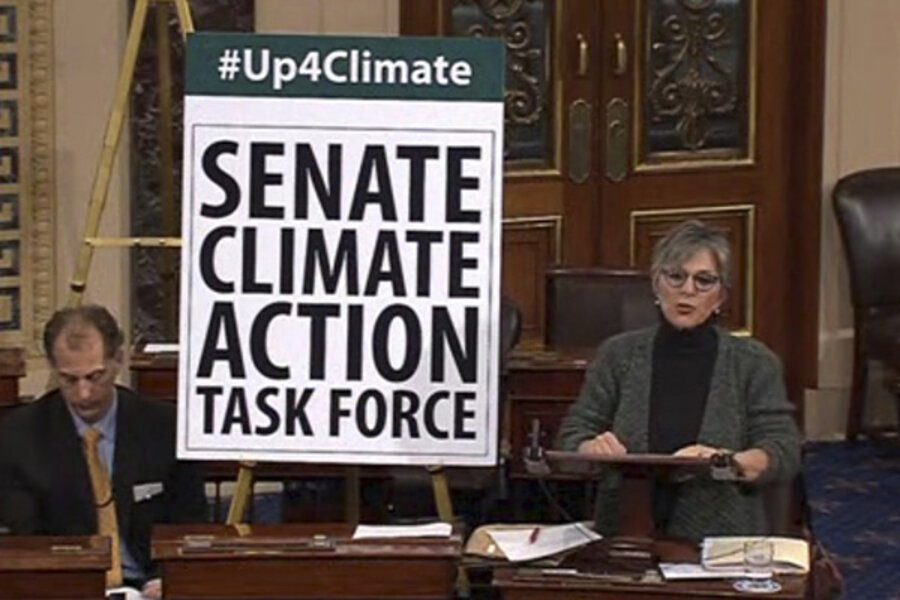Want to reduce greenhouse gas? Try a carbon tax.
Loading...
This morning, the White House released a massive report on the effects of climate change. In sum: The problem is already bad, it is going to get worse, and we need to address it quickly. The science of greenhouse gas emissions and climate change may be clear (though, of course, always evolving). But the policy response is far murkier.
Yet there is a relatively simple solution, based on the old economic maximum: If you want people to do less of something, raise the price. In this case, if you want people to use less carbon-emitting fuel, tax it—a lot. Sadly, the report barely mentioned carbon taxes anywhere in its 829 pages.
For years, the U.S. has fumbled with an alternative response: an incomprehensible maze of regulation and subsidies. This toxic mix of positive and negative incentives is confusing, easily gamed, inefficient, and largely ineffective.
Consider: We subsidize production of fossil fuels but then attempt to limit their use through fuel efficiency standards and emissions limits. Then we provide tax breaks for producers and consumers of alternative fuels so they can compete with subsidized carbon-based energy. You can’t make this stuff up.
A carbon tax could cut through the mess. The government could drain much of the current swamp of environmental and energy regulation, get rid of all those targeted subsidies and, instead, tax carbon fuels. By itself, this would cut demand for oil and coal and increase demand for alternative fuels such as solar, nuclear, and wind. Beyond the carbon-based/ non-carbon-based choice, it would sharply reduce government’s role in picking winners and losers and at least limit the potential for the next ethanol and Solyndra fiascos.
A carbon tax has broad support among economists across the ideological spectrum, but remains politically unpalatable. There are some serious policy reasons for this. For instance, a carbon tax (or its policy cousin,a cap-and-trade system) can be deeply regressive—a problem that could addressed with other tax changes.
But the political problems are far more challenging. Here are just a few:
If-Obama-is-for-it-we-are-against-it: Once, cap-and-trade was supported by influential Republicans such as President George H.W. Bush and 2008 presidential candidate John McCain. Then, President Obama embraced it. Now, it is an idea with many enemies and few friends.
Bureaucratic resistance: Inside the executive branch, officials love complex solutions to problem such as carbon emissions. No fewer than 16 federal agencies and a half-dozen separate White House offices had a hand in the Administration report released today. Everyone from Homeland Security to the Smithsonian got in the act. From a bureaucratic point of view, everyone wants a piece of climate change. But the role of most agencies would be limited or even eliminated if policy is based on a carbon tax.
Congressional resistance: It is the same problem with Congress. Today, just about every committee has some piece of the climate change action. Every lawmaker gets to hold a fundraiser (the deniers as well as the accepters). But with a tax-based system, only a relatively handful on the tax-writing committees could cash in.
The lobbyists: Entire industries have been built around all those regulations and subsidies. For instance, while solar prices are falling, the industry is still addicted to generous tax breaks. Could it make it in a carbon tax environment? It very well might. But business—even green business—does not like uncertainty.
Don’t mess with my car: Right now, Congress can’t work up the courage to raise the gas tax by a few pennies to support desperately-needed highway and bridge construction and repair. Imagine the firestorm if gasoline taxes were raised by, say, 25 cents. Tea party anyone?
Yet, there are enormous potential benefits to such a levy. A modest carbon tax could reduce greenhouse gas emissions by 10-15 percent, according to several recent studies. Last year, my Tax Policy Center colleagues Donald Marron and Eric Toder found that a tax of $20 per ton would raise enough revenue to significantly buy down corporate tax rates. Corporate tax reform would even be possible if some revenue from the carbon tax were used to finance a rebate to help offset the inevitable tax increases for low-income consumers.
The political system may not be ready for a carbon tax, but it is hard to read this new climate change paper without thinking about how valuable such a levy could be.





